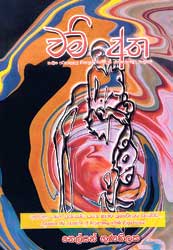
Exposing the facadeHis one ambition in life is to see an alien, says Nelson, a canteen worker at the Peradeniya University and author of Vam Atha, a collection of free verse I first met him not in person but through his poetry. The Faculty of Arts at the University of Peradeniya has three main canteens apart from the Main Students' Canteen (WUS). One is the Senate canteen and the other is the Gemba. It is on the walls of these canteens that the students find a collection of Sinhala free verse posted from time to time.
They were special- typical university (or I should say Arts Faculty) material; radical, critical and questioning. They were signed by a simple line; 'Nelson Gunathilaka, Gemba Canteen.' My first conception was that it was a student but the reference to the canteen was deceptive. I met Nelson in person when he began work on publishing his book Vam Atha. At present he is employed as a waiter at the Gemba. The theme of his collection of free verse is Ath vindina gaman prathikshepa karana maanava kramavedayata erehiva- against the human methodology of hypocrisy. The poems are wide ranging - from sexuality, religion, education, society, politics, human nature and behaviour, all of them very short verses but powerful. The range maybe broad but the theme never escapes from the poetry. They all question what we perceive as reality and attempt to present a totally different and radical viewpoint. The book was launched on January 24 at the Arts Theatre, Faculty of Arts, University of Peradeniya in the presence of many distinguished academics and students. Born in Menikkhinna, Nelson Gunathilaka now lives in Kamburadeniya which he says is a beautiful and peaceful village. He studied until his G.C.E. A/Ls but due to economic problems in the family went to look for employment. "Anyway, those days though we did study we did not have big dreams of entering the university. The greatest enjoyment was to get together in the evenings, enjoy the taste of a Ra Polkatta and a piece of mayyokka, listen to Muvanpalassa and go back home happily. But if I had any sort of support, I know I will be in a big place now." As a second thought he adds that then he will not be happy, because if he was in a 'big place' he will not be doing anything worthwhile. Nelson began his writing about eight years ago. His first poem was about the elephant at the Dalada perahera. He says that there are three things that an elephant is afraid of; fire, sound and unknown routes. It's exactly these three elements that the animal is exposed to during the perahera. "People make obeisance to the animal for bearing the Sacred Tooth Relic but they never see the pain and fear the animal goes through," he says. "I watched it one day and I felt the pain myself." This is what inspired him to pen his first lines of poetry. Nelson was a leading figure in his village where he organized various programmes to felicitate those who rendered social service. His second but most important aim in life, he tells me, is to see an alien. But since this is not accepted in society he had been considering another activity. It was around 1 ½ years back and it was then that he joined the University canteen. Here he used to see a beggar whom he says was 'a beggar of principles' for he never had hypocrisy, greed or deceit. "He was like a mirror; he never took anything nor kept anything to himself. I was interested in him and I went and spoke to him one day." But fate had her own plans. Three days later this beggar, who until then had never spoken to anyone, died. "When this happened I knew that I had to somehow bring out the reality of this world. We live in such a world that we have created on our own which is all a facade. A book was the best way I could think of."
He chose a theme which he believes is the closest to reality; hypocrisy. He gathered all his poems which came under this theme. Going through the collection, one is prompted to question one's own beliefs and standards and realize that we all are part of this game of deceit, discrimination, jealousy, hatred and perceived self-importance. The publication is backed by many people. Nelson thanks his employer, the IRQUE and IBG Project, the staff and students of the University who appreciate his work and every individual who helped him. He says this is the only book that he will publish. "I don't like to do the same thing twice." He feels he is fortunate to be part of the University environment which will undoubtedly recognize his ideology. He also believes that the Universe is God and his prayer every morning to his God is to stop the disastrous war and bring peace to our country. "And I will never forget my greatest aim. Even if I have to stay up all night for days, I will somehow see an alien because I know it is only something out of this world that can change this place and make it peaceful and natural." |
|
||||||
|| Front
Page | News | Editorial | Columns | Sports | Plus | Financial
Times | International | Mirror | TV
Times | Funday
Times | Kandy
Times || |
| |
Reproduction of articles permitted when used without any alterations to contents and the source. |
© Copyright
2008 | Wijeya
Newspapers Ltd.Colombo. Sri Lanka. All Rights Reserved. |

